Review:
Schelmish, “
Persona Non Grata” (Released 7-5-2010)
BACK TO THE ROOTS!
Every now and then it happens that you get into the possession of a new album and it already makes you happy before you have heard more than a fraction of its contents. For me the 2010 release of
Schelmish’s, “
Persona Non Grata” , is just such an album. The reason is clear:
Die Schelmen, (loosely translatable as “vagabonds”), have musically returned home to the roots from which they once started, medieval folk.
Schelmish started way back in 1999 as just that, a medieval outfit, using ancient instruments only. Still they sounded kind of heavy, due to the use of the Davul, “donnertrommel”, (Thunderdrum), and other heavy medieval percussion instruments. Their unique sound, heavily relying on an incredible variety of bagpipes, together with their lawless (
Schelmish) and pagan image, not to speak of several well performed albums in this style, brought them a large fan following and made them into a much favored act at many a festival.
But, by the middle of the first decade of the 21st century the selfdeclared, “fetteste mittelalter band Deutschlands” (fattest medieval band of Germany, which makes sense if you are accustomed with the average weight of the band members), had begun to change, and certainly not for the better.
From 2004 on, at first slowly, the band electrified more and more. The first endeavors on this way in fact were still cheered upon by most of their long term fans and I also confess that heavy electric tracks like “The Pussy Twister” and “Ring of
Fire” were a welcome variation from their acoustic sound to me.
But by 2007, die Schelmen had decided to completely do away with their old concept and try their luck at completely electrified music in the Rock/
Metal style. Their first production in this new direction, the 2008 album “Wir Werden Sehen” was one of the biggest disappointments I ever encountered as a music fan. Except for the lyrics, which continued to express the free, lawless nature of the band, there was nothing than soullessness and disillusion to be heard. If it proved anything, than it was that this outfit is utterly incapable of playing Rock in the modern sense. They should have apologized to their public for it and quickly have blown the dust of their bagpipes once more.
Still they hadn’t learned their lesson and came last year with a follow up, “
Die Hasslichen Kinder”, in more or less the same style, a little upgraded, yes, but renewed evidence of their incapability to play music like that.. Had however the title of the 2008 album, which translates to “We
Will See….” Already indicated that their choice for the electric path might not be definite, the 2009 release carried a few more hints in this sense, especially with the brilliant track “For the Clansmen”, so we, the clansmen, the fans, kept the flame of our hope burning.
Then, at the end of 2009, the news reached us that
Schelmish was indeed working on a new, fully medieval style, album.
Overcome with joy and naughtiness we all rushed to our cupboards, once more donned our bearskin jackets and harlequin shoes and started polishing our rusty swords in nervous anticipation.
We were not disappointed! When in early May “
Persona Non Grata” hit the shops, it was like Atilla had reassembled his Huns and was once again burning the churches and ravishing the Christian lands. Overburdened with joy and pride we got hog-drunken and sang battle hymns at the campfires with renewed vigor.
“
Persona Non Grata”, A CONCEPT ALBUM
According to statements of the band the album is dedicated to all those in history who have lost their
Lives because of their beliefs, (for the European medieval case this can best be read as : Those who lost their
Lives on the burning pyres and the stakes of the Christian church because they refused to give up their adherence to their old beliefs and ideas, in short their Paganism). To express this theme the album is set in the form of a concept project which expresses the sufferings and the feelings of a “spielman”, (wandering musician, bard), of old and describes his sufferings, his sadness and his other feelings over a thousand year period, (The entire duration of the middle ages). As no human being
Lives that long the central figure in fact stands for all who suffered persecution during the long middle ages.
I can already hear those who are less acquainted with the art of music ask themselves: “But only five out of 16 tracks on this CD carry lyrics of any volume, how can a story be told like that?”. Well, did a Shostakovich need any words to express the violence and devastation of war in his symphonies?, No, he didn’t. Did Haydn? No, he didn’t. Did Mussorgsky need lyrics to express the greatness of his country and his joy about it? No, he didn’t. Here we find a special quality of music, the best performers in this art are able to express any emotion or tell any story just by using their instruments skillfully.
Schelmish belongs to the most talented of their art, and expressing very clearly what they want is just what they are doing on this album.
GENERAL MUSICAL OVERVIEW
As is already clear from the past paragraphs, the newest
Schelmish album is for the lager part instrumental and played entirely acoustic, using solely medieval instruments. Can such a production be called “
Metal” and if so, how to justify such? Playing instrumental has long been accepted in the metal music scene. As has just been mentioned, a skillful artist doesn’t per definition need words to make clear his point. Besides that, not all music necessarily needs to have a message: L’art pour l’art has long been an accepted principle in the artistic world, so why could it not be applied in music?
Second part of the question is more tricky to answer. Since the appearance of such musical genres as folk metal, pagan metal, ambient metal and others, drawing a clear line in definition has become even more difficult than it already was. For some fundamentalists only music that is built up from heavily distorted guitars, thumping bass, aggressive hammering on drums and loud vocals, that are shouted, shrieked or growled, can be qualified as metal. But they should be aware that they are speaking for just some of the subgenres of metal, the allover reality is much more complex.
First, metal is not only sound, but probably much more important it is spirit and in spirit a phenomenon like
Schelmish is definitely metal, as the topics that are touched in their music are most similar to those common in black metal and epic metal, so are the feelings that are expressed about many an aspect of life. But, to not unnecessarily complicate things, we can just stay with the sound. Although playing exclusively or largely acoustic, several medieval bands, including such as
Feuerschwanz, Furunkulus, our
Schelmish and others, use their percussion elements in a way that makes the total experience of their music outspokenly heavy and just as unpalatable to those who dislike metal in the general.
Schelmish on their new album makes lavish use of the Davul (The Thunderdrum), and other heavy medieval percussion. So, if asked if this is indeed a metal album, I answer, yes it is, maybe a fringe or very peculiar one, but still it is. I dare to go further, this kind of heavy percussion dominated medieval music lies at the root of part of what is modern metal music.
THEMES OF THE CONCEPT ALBUM
More directly to what is actually on the CD now. Earlier reviews of this album have remarked that there are distinctive elements recognizable in the instrumentation. Oriental/Arabic, which is often present in the intro parts of the songs, Celtic which is very dominant in most of the instrumental parts and Slavonic which immediately becomes evident as soon as vocals are involved in the song, - It might be superfluous to mention that the band is from Northern Germany, and that most of the theme of this concept album is indeed about the persecution of Germanic people in the middle ages –
The hidden message in this is not that difficult to decipher, Slavonic, Celtic and Germanic pagans were almost equally persecuted in medieval time, and once on the blacklist of the church of
Rome, there was only one way to save ones life, exile in the near East countries with their oriental cultures (It is very little known to most, but the Islamic cultures of the near East, especially the pre- and early Ottoman, were remarkably tolerant to and offered hospitality to those who were trying to escape from the stakes and burning pyres of medieval
Europe)
So, we have defined the main topics of the concept that’s behind this album: Adherence to ones own beliefs in the face of danger, persecution, exile and with that last homesickness. Now, how does such finds expression in the songs on the album? As far as lyrics are there, that might be quite obvious, but the real great expressiveness in laying down various emotions is to be found in the scapes of the instrumental parts, were for those capable and willing to, subtle but clear hints are to be found everywhere indicating such human character traits and emotions a such as: Standfastness, righteousness, fear, the will to survive, loneliness, gratitude, above all homesickness and as an utter consequence acceptance, the last finding a non-mistakable expression in song no. 12’s sole line of text, “C’est la vie, mon ami” –
That’s how
Live is, my friend”
ALBUM CONTENTS: RELEASE, TITLE, SLEEVE
Most unusual for
Schelmish the album is self-produced. The band was never known for its long lasting relations with record companies and it seems that the auto-production of this release might mark a definite break with their former label
Napalm Records, for which they produced just 1 album. It might also be that the company lost interest in the band, as
Napalm is not exactly a label associable with medieval folk. Whatever the real reasons for this move may be, an outfit as experienced and successful as
Schelmish can certainly afford to auto-produce their albums and still get them into the right distribution channels for wide dispersion.
The title of this album explains a lot in itself, “
Persona Non Grata”, a Latin phrase meaning as much as “a person who is out of favor” or “unwanted person”.
That summarizes nicely what the topic of the album is. But one must understand that 500, 700 years ago the term had a harsher meaning than it has now. In those times being out of favor, (with those in power), meant as much as a death sentence, and the only thing left to do was run for your life, as far as you could.
The sleeve design is neither of great beauty nor of great originality according to the rather high standard that Shelmish showed in the past. It is a rather literal sun wheel depiction of the one-eyed father sun, set against a background what seems to be a piece of time worn medieval cloth. Anyone who knows at least something about Wotanism and/or Shamanism can easily explain to you the different explanations of such a depiction. Nicely done and quite in style, but not something to call home for in excitement.
ALBUM CONTENTS: THE SONGS
The first track, simply called “intro”, immediately takes you out of your everyday setting and sucks you into the old oriental world and gets you used to one of the main themes of the album, that is forced exile. Unbelievably skillful handling of the instruments, and to start with an almost absence of bagpipes. The song does feature some background chanting in oriental style, but I wasn’t able to determine in what language, although it is probably in Turkish or Arabic, (
Two languages which I do not understand anyway, forgive me, my linguistic knowledge is limited to Northern European Germanic languages plus a basic knowledge of French).
The second track Illuminatio is a rather lengthy instrumental, in its intro creating the atmosphere of a flight with thunderstorms and uncertainty ahead, but enough danger beyond to take chances. To indicate where the journey is leading the rest of the song lays down an ever more oriental, but not necessarily all to friendly, feeling: The start of a forced exile. Great percussion work and a generally sad undertone.
The emotional and ethnical pattern is continued, but with the dynamism of the new, on the third track, also instrumental and Latin titled (Use of Latin and dialects of it has been a repeating feature of
Schelmish) “Lux Lucet in
Tenebris”. The fourth song is one of the keys for understanding the concept, German titled “Abends wenn die fremden beten”. It is also the first song containing real lyrics, necessarily in German this time. The intro starts with the chant of a muslim evening prayer, followed for the first time by more Celtic sounding bagpipes and percussion. The text of the song is a wonderful piece of poetry, but for now it is enough to understand the first two phrases “Abends wenn die fremden beten, weine ich meine heimat fern” – In the evening when the strangers pray to their god, I cry for my distant homeland – The vocals being sung in Slavonic style it all emphasizes loneliness, home sickness, mixed with a whiff of gratitude to be still a
Live.
With the tone now firmly set, the album continues with the instrumental “Via Sacre”, with the thorough mixing of Celtic, Oriental and more Germanic instrumentalism, it is left somewhat in the middle whose “Holy Way” it is exactly about. The otherwise quite monotonous sixth track continues with this mix of instrumental elements and is appropriately called “Vasilis, tanz der Volker” (Vasilis, the dance of the people’s), indicating that placed for such problems,
Schelmish does not favor the standard black metal solution of “
Kill everyone who is not our kith and kin”
Number 7, less clearly showing the mix of ethnic musical elements, is called “Non de Falsis Argumentis”, goes on with sad undertones and is also the second track that contains lyrics in a combination of Retro-Roman and German. Here also for the first time the need to keep going under adverse conditions makes its inroad as an emotional element. Such idea of “we have to work with what we got”, continues with “
Aurora”, which is a very danceable instrumental track, showing at least some cheerfulness, but tempered by harsh circumstances.
Follow-up instrumental Muscipulum goes one step further, strongly suggesting an assimilation process, in which the oriental and the Celtic can indeed be compatible and used in a mutual cheerfulness. Cheerful excitement is however much tempered on “Candida
Hora”, yes, it is a dancing tune, but one with sad under- and overtones. Now almost lacking the oriental sound, it marks the onset of an irresistible homesickness.
“Ouwe
War” (title in medieval Diets this time, but sung in standard German), marks a return to fully European sound elements and the sadness resulting from the realization that what once was is never to return in all its dream-grlory. All before have prepared the epic for its first conclusion “C’est la vie”, which is surpringly, for the listener caught unawares, a genuine
Caledonian funeral march, sad and slow on the way to the cementary, but more and more cheerful on the way back to the tavern where after a few swigs of strong alcohol the moderation “C’est la vie, mon ami” is relatively easily reached.
Had the album ended here, that would have made perfect sense, but now it continues now with
Luna Pernocte, which has the undertone of repetition, hidden aggression and even war. Let’s file it under “History repeats itself”. If that wasn’t clear enough to the listener, the next one “Saltatrello
666-and-a-halve” (With a deep bass voice full of aggression shouted intro by Dextro: “Lets us now celebrate further with Saltarello
666 and a halve”), a warlike tune with gives a further message in the sense of, “that we will do our utter best to be friends with those who haven’t hurt us, but there are limits in fiendishness which we can tolerate, beyond that we are a little worse than your worst nightmares”
Two of the longer tracks now remain, “
Persona Non Grata”, indicating that nothing much has changed in the one thousand years that have now passed, and it are still the same foes who declare persons to be “unwanted” (But this I conclude from pure feeling, as I do not understand the Latin in which it is sung). “
Quo Vadis” , the outro, basically does the same, but from another point of view, expressing the melancholy of wishing to hold on what was once and seems lost for most.
CONCLUSION
What was the best here? Well, everything was great, one long journey into the past, but with a clear influence of what plays a role in our present thinking of what is moral or not. “
Persona Non Grata” as a whole can take you for over an hour, (well, more if you keep playing the tracks again and again, like I do), out of your normal existence and lead you back into the mist of time and face for yourself the plethora of unjustice that one man has done to another and let that stimulate your brain’s ability to make a stand about what is moral and what is not.
But if you force me to, “C’est la vie” is the best piece for me as well in the musical sense, as in its concluding nature, laying out to us the necessity of acceptance when there is no direct threat to vital elements of oue existence.
Hope, the clansmen can agree with me, we will not attack anybody as long as they refrain from attacking us. But just for the case: We will keep our swords polished, sharp and right at hand.
I have waited a couple of months before writing this review, as I wanted my first emotions to sink in a bit.
Others, writing for other web- and magazines, climbed into their pen earlier and declared this to be
Schelmish’s best album ever, or even the best to have appeared in medieval music whatsoever. I beg to differ somewhat here: In both categories for me that is still Schelmishe’s 2003 release “Tempus Mutatur” and it would be very hard for anybody to ever eclipse that one. Notwithstanding, this is a great album, I give it 19 out of 20 only, because of fear that if someone indeed manages to come with something better I couldn’t give that one 21. I feel ashamed now that I gave the previous release of the band 18/20, in comparison with this it by far not deserved that. But, OK, I was taken away, by “For the Clansmen” and in fact judged that song.
Keep on track now Schelmen! We trust in you once more! (By, the way I get the feeling I want to get hog-drunken now, want to join me……?)
Gletscherwolf, 20 September 2010
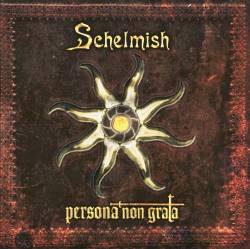
 Schelmish : Persona Non Grata
Schelmish : Persona Non Grata









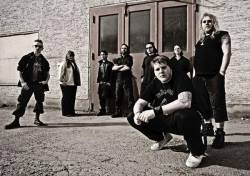
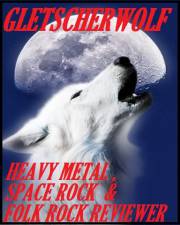
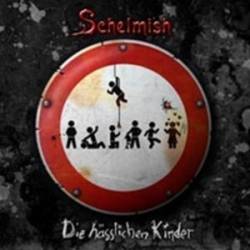
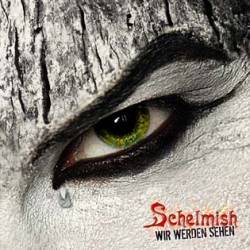

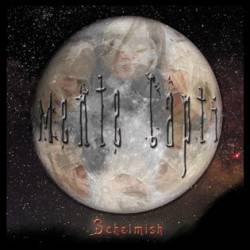
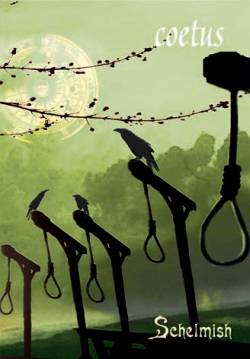
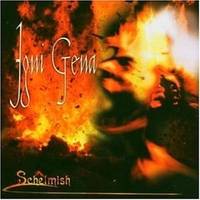
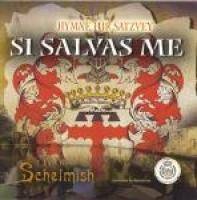
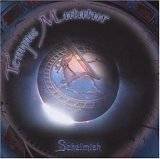
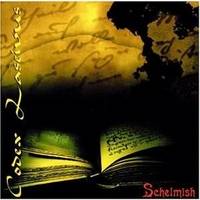
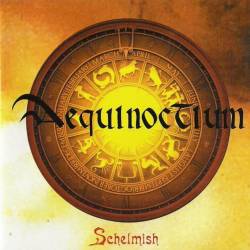
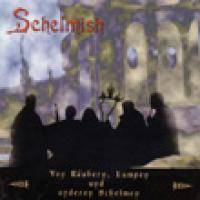
Tienes que ser miembro para poder añadir un comentario